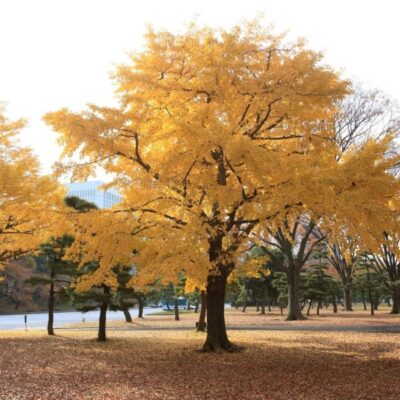Garden Plant: Ginkgo Trees
Product Description: Ginkgo Trees

Lovely Fall Color, Indestructible Ginkgo Trees
- Fascinating Historical Tree
- Unique Fan-Shaped Leaves
- Beautiful Fall Color
- Showy Display as Leaves Fall to the Ground
- Grows in a Wide Range of Soils
- Resistant to Pests, Disease, Pollution and Wind
The Ginkgo tree (Ginkgo biloba) is also called the Maidenhair tree because it resembles Maidenhair ferns. It is truly unique and has no close living relatives.
It’s also one of the oldest living types of trees. Botanical gardens around the world feature this beautiful “living fossil. ” You’ll be proud to own one.
Yes, this is the tree used in Ginkgo biloba supplements to improve memory, symptoms of dementia and blood flow. Specimens are reported to exist around China that are over 1800 years old. Bet you didn’t know how pretty it is!
The leaves on the Ginkgo are an interesting fan shape that flutters in the slightest breeze. They are dark green leaves from spring to summer, usually 2-4 inches but can sometimes be up to 6 inches long.
The Gingko has long been appreciated for its well-behaved root system. This is a great tree for use around walkways and patios, because the roots stays deep and are not prone to lift pavement. This is why the tree has become a very popular street tree.
Once established, the Gingko requires little maintenance or pruning. Typically it has a lovely canopy that grows with perfect balance.
In autumn, the beautiful leaves turn a brilliant, saturated yellow. This is one of the most favored and popular characteristics of the Ginkgo tree. They simply glow in the landscape and make a heart-catching addition to the season.
When those leaves turn a brilliant and clear yellow, you will find that the Ginkgo leaves may all fall in one very short period of a day or two. It’s a marvelous display as the leaves blanket the ground beneath almost overnight. That also makes lawn cleanup easy!
Place it where You’ll see the fall color display. This gorgeous deciduous tree is perfect for a street tree, shade tree or as a lawn tree.
How to Use Ginkgo Trees in the Landscape
Ginkgo trees tolerate a very wide range of conditions and are simply not bothered by insect or disease problems. Use them in your shelterbelts and windbreaks to add some diversity to the barrier. They tolerate open windy areas well.
Ginkgo are slow to establish. But once they get going, they will be there for the rest of your life.
Include them in your mulched beds and under plant them with smaller shrubs and perennials that can take shady conditions.
Use them as you would an Oak tree. These are rugged trees. They’ll be perfect in hot, dry climates, and tolerate urban air pollution.
Of course, Bonsai enthusiasts should consider these “real deal” trees for their collection.
Pro Plant Tips for Care
The Ginkgo tree can tolerate most anything. As long as the drainage is good, it does well in poor soil, compacted soil and can withstand drought, winter salt and even air pollution. They are usually deep rooted and resistant to snow and wind damage.
It will perform best in full sun, so site it carefully. Tough, strong, and very resilient… that is a Ginkgo!
The Ginkgo Tree can live 1,000 or more years. This native to China has been around since the dinosaurs and is as beautiful as it is beneficial.
It is a conversation starter that would be an interesting – and useful – addition to any yard.


